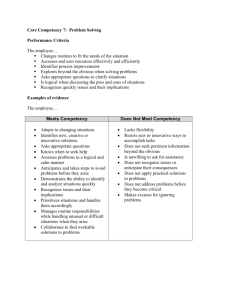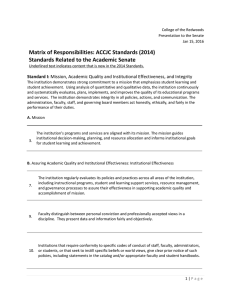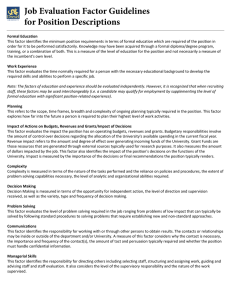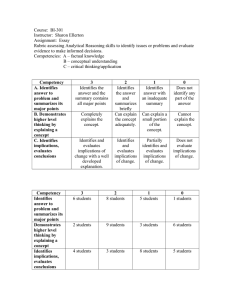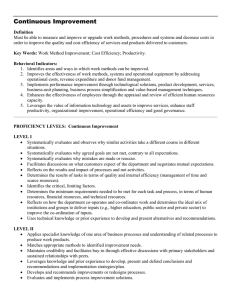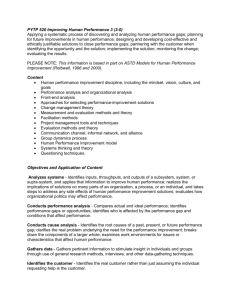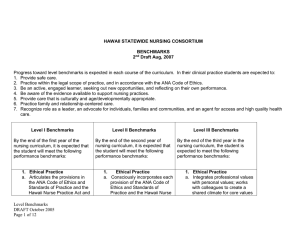What are the Information Competencies? A Proposal for Hartnell College
advertisement
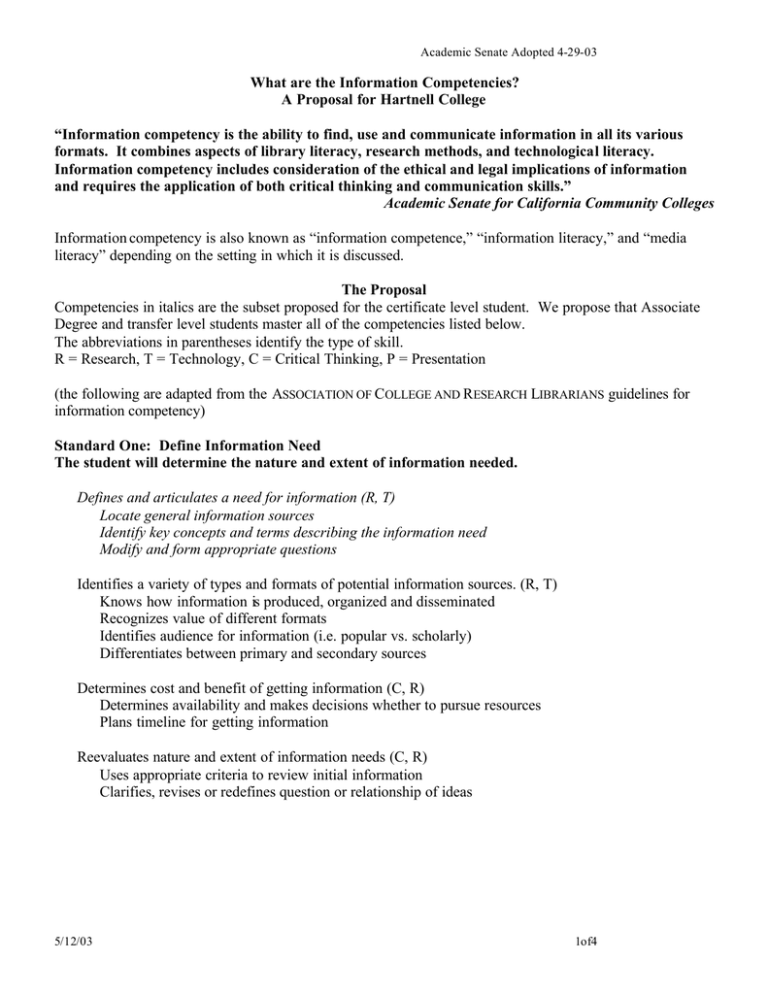
Academic Senate Adopted 4-29-03 What are the Information Competencies? A Proposal for Hartnell College “Information competency is the ability to find, use and communicate information in all its various formats. It combines aspects of library literacy, research methods, and technological literacy. Information competency includes consideration of the ethical and legal implications of information and requires the application of both critical thinking and communication skills.” Academic Senate for California Community Colleges Information competency is also known as “information competence,” “information literacy,” and “media literacy” depending on the setting in which it is discussed. The Proposal Competencies in italics are the subset proposed for the certificate level student. We propose that Associate Degree and transfer level students master all of the competencies listed below. The abbreviations in parentheses identify the type of skill. R = Research, T = Technology, C = Critical Thinking, P = Presentation (the following are adapted from the ASSOCIATION OF COLLEGE AND RESEARCH LIBRARIANS guidelines for information competency) Standard One: Define Information Need The student will determine the nature and extent of information needed. Defines and articulates a need for information (R, T) Locate general information sources Identify key concepts and terms describing the information need Modify and form appropriate questions Identifies a variety of types and formats of potential information sources. (R, T) Knows how information is produced, organized and disseminated Recognizes value of different formats Identifies audience for information (i.e. popular vs. scholarly) Differentiates between primary and secondary sources Determines cost and benefit of getting information (C, R) Determines availability and makes decisions whether to pursue resources Plans timeline for getting information Reevaluates nature and extent of information needs (C, R) Uses appropriate criteria to review initial information Clarifies, revises or redefines question or relationship of ideas 5/12/03 1of4 Academic Senate Adopted 4-29-03 Standard Two: Access Information The student will access information effectively and efficiently Selects appropriate methods and retrieval systems for accessing information (C, R, T) Selects effective and efficient approaches for accessing information in print and non-print databases Investigates scope, content, and organization of information retrieval systems (e.g. book catalogs, periodical indexes, databases, search engines, etc.) Selects appropriate tools Identifies search language Evaluates type of source material in each resource Designs and implements effective search strategies (R, T) Develop search plan Identifies key words, related terms Selects appropriate vocabulary for source Implements search appropriate to source Implements searches in varied retrieval systems Develops research design using experimentation, observation, interview, surveys, or checklists to gather information Retrieves information online (search mechanics) (T,R) Uses locally available search systems Uses other search systems Uses search engines Uses browser and email Refines search strategy (C) Assesses information for quantity, quality and relevance Identify gaps Repeats search strategies for more information if needed Records and mana ges information and information sources (R, T) Systematically organizes information Records citation information Demonstrates effective use of technology to organize and manage files Differentiates between types of sources cited and information needed for citation Records raw data from observations using anecdotal notes, running records, frequency tallies, video or audio recordings, or checklists 5/12/03 2of4 Academic Senate Adopted 4-29-03 Standard Three: Evaluates information The student will critically evaluate information and its sources Discusses information gathered (P, C, T) Participates in classroom and other discussions Participates in electronic communication Evaluates if information found is adequate for question (C, R, T) Determines whether information is sufficient in quantity, quality, and type Reviews search strategy and revises if needed Reviews sources and revises if needed Demonstrates understanding of main ideas from information gathered (C) Reads text and identifies main ideas Restates concepts in own words Identifies quotable information Evaluates information gathered (C) Examines validity, accuracy, authority, bias, timeliness Analyzes logic of arguments Recognizes prejudice, deception and manipulation Recognizes cultural context of information Compares data to hypotheses formulated in scientific research Assesses and evaluates observed data using appropriate tools Compares new and prior knowledge and synthesizes to construct new concepts (C) Determines if information is satisfactory for original research question Questions validity and appropriateness of data Evaluates if information sources are contradictory Draws conclusions from information Integrates new information Selects retrieved information to support topic Standard Four: Apply the Information The student will apply the information to accomplish a task Synthesizes information to complete project (C, R) Organizes information, e.g. into outlines, drafts Uses quotes and paraphrases to support argument Summarizes main ideas and/or paraphrases main ideas Organizes information gathered to plan and implement projects, e.g. lesson plans Uses information to develop and use good strategies for project implementation Communicates the project effectively (P, T) Uses appropriate style and format for academic project Uses appropriate media for project presentation (print, web, video, etc.) Uses communication appropriate for diverse audiences (ADA considerations, multicultural consideration, etc) 5/12/03 3of4 Academic Senate Adopted 4-29-03 Standard Five: Ethics The student will understand many of the economic, legal, and social issues surrounding the use of information and will access and use information ethically and legally. Understands the ethical, legal, and sociopolitical issues concerning information and technology Distinguishes between free and fee-based access to information Comprehends intellectual property, copyright, and fair use of information Understands the codes of ethics appropriate to the field of study Recognizes the laws, regulations and institutional policies and etiquette related to access and use of information sources. Uses approved passwords or I. D.’s ethically Demonstrates understanding of plagiarism and properly attributes the work of others Complies with institutional policies on access to information resources Understands and practices code of ethics and laws regarding the use of personal information and privacy Demonstrates confidentiality with sensitive information Acknowledges use of information sources (R) Recognizes that all sources require documentation Uses appropriate documentation style for citing sources 5/12/03 4of4
